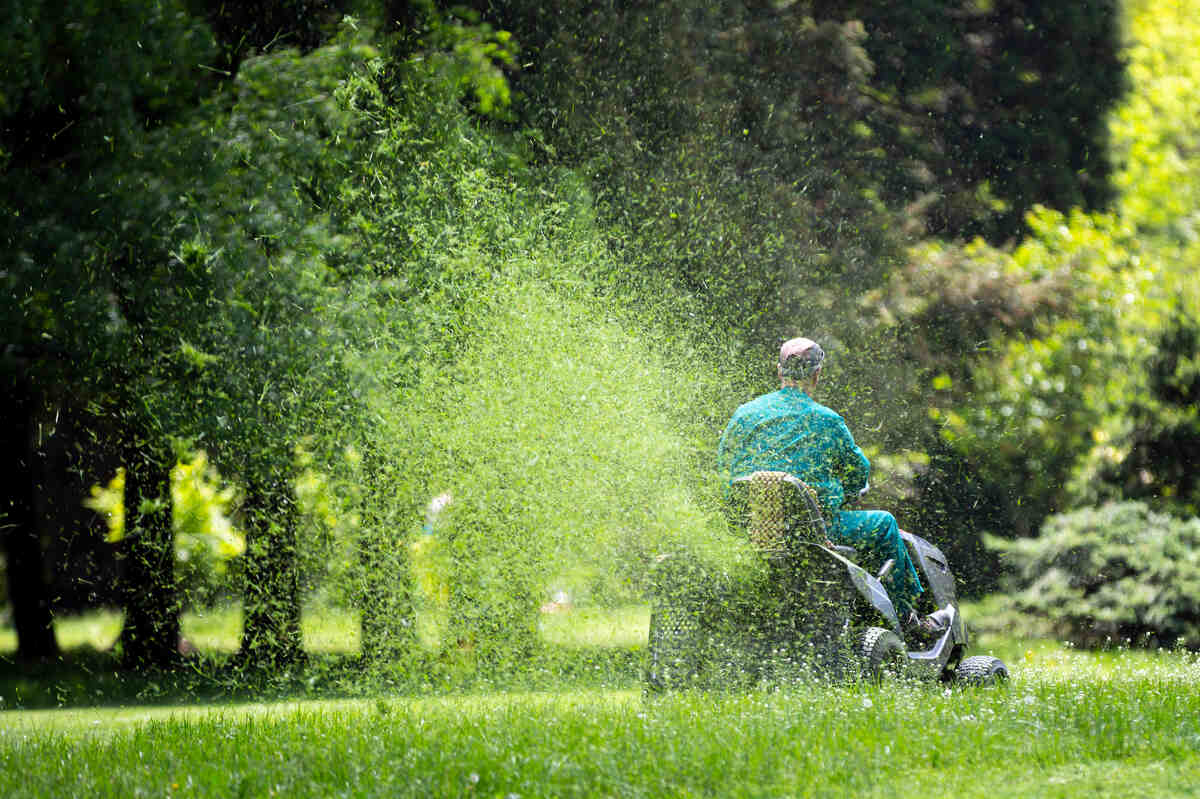
We all make mistakes sometimes. Luckily, lawn mowing mistakes are easy to avoid once you’ve identified them.
Common lawn mowing pitfalls include not staying on top of lawn mower maintenance, following an inconsistent mowing schedule, and mowing at the wrong speed or in the heat of the day. With advice from a turfgrass specialist, learn 13 common mistakes to avoid and how to fix them to achieve a healthy lawn.
- Mowing Grass Too Short
- Mowing With Dull Blades
- Mowing Wet Grass
- Mowing During the Heat of the Day
- Mowing Too Infrequently
- Always Mowing in the Same Pattern
- Not Overlapping Lines
- Always Collecting Grass Clippings
- Ignoring Lawn Mower Maintenance
- Not Cleaning Your Lawn Mower Deck
- Using the Wrong Lawn Mower
- Not Clearing Your Lawn
- Mowing at High Speed
- FAQ About Common Mowing Mistakes
1. Mowing Grass Too Short
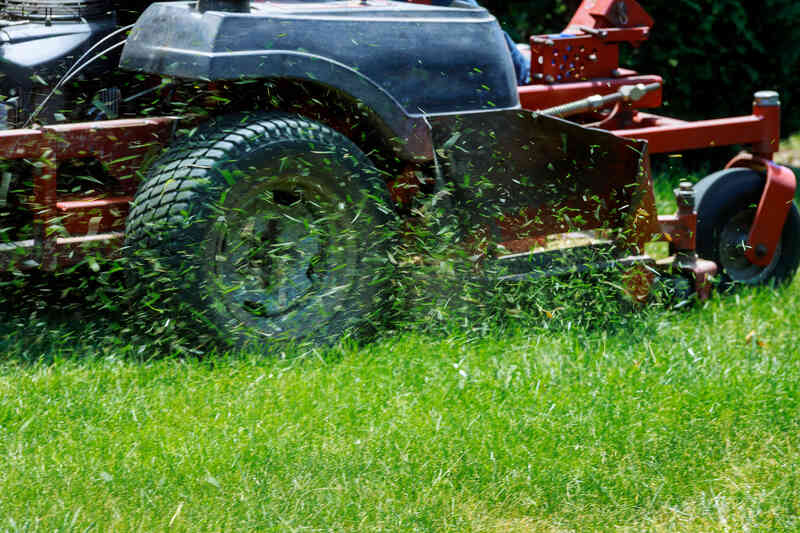
Mowing your grass short might seem like a clever time-saver to reduce how often you need to mow. But mowing grass too short, called lawn scalping, is harmful to your lawn.
When grass is short, sunlight gets through and encourages weed growth, but tall grass shades the soil. Scalping also stresses your grass, which can dehydrate your lawn and leave it susceptible to lawn insects and common lawn diseases.
Pro Tip: Don’t panic if you accidentally mow your lawn too short. Give your grass time to recover and grow back. If needed, a little extra watering can help your lawn recover more quickly.
Solution: To avoid scalping your lawn, follow the one-third mowing rule, which dictates that you should never trim more than one-third of your grass’s total height at a time. Every type of turfgrass has a different mowing height, so find the recommended mowing height for your turfgrass type in the chart below.
| Type of Grass | Average Height | When to Mow |
| Bahiagrass | 3 to 4 inches | 4.5 to 6 inches |
| Bermudagrass | 1 to 2 inches | 1.5 to 3 inches |
| Buffalograss | 2 to 4 inches | 3 to 6 inches |
| Carpetgrass | 2 inches | 3 inches |
| Centipedegrass | 1 to 2 inches | 1.5 to 3 inches |
| Fine fescue | 1 to 3 inches | 1.5 to 4.5 inches |
| Kentucky bluegrass | 2 to 3 inches | 3 to 4.5 inches |
| Perennial ryegrass | 2 to 4 inches | 3 to 6 inches |
| St. Augustinegrass | 2 to 3 inches | 3 to 4.5 inches |
| Tall fescue | 2.5 to 4 inches | 3.75 to 6 inches |
| Zoysiagrass | 1 to 2 inches | 1.5 to 3 inches |
If time is an issue, don’t mow the lawn too short, call in a lawn care professional to mow your lawn for you, saving you the time and hassle.
2. Mowing With Dull Blades
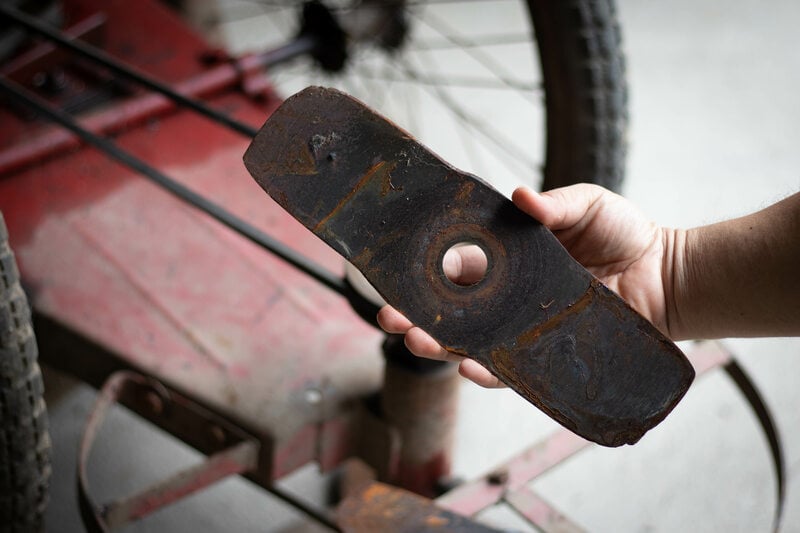
There’s a reason we refer to mowing as cutting the grass, not tearing the grass. But when mowing blades are dull, tearing the grass is exactly what happens.
Mowing with dull blades is a recipe for a yard full of brown or yellow grass. Not only do dull mower blades make your grass look ragged and uneven, torn grass also leaves your lawn susceptible to diseases and lawn pests.
Solution: “Sharpening and balancing the blade a couple of times per mowing season will make all the difference in the world,” says Michael Goatley, Jr., professor and turfgrass specialist at Virginia Tech.
- How often you should sharpen mower blades: Goatley recommends sharpening mower blades at least 3 times over the growing season. Goatley notes that homeowners who sharpen their mower blades more than once are likely already doing better than the average homeowner. “But that’s still not enough,” Goatley says.
- How to sharpen lawn mower blades: “If you have a bench grinder or grindstone AND have enough experience on how to properly put an edge at the correct angle on the blade, it is certainly something that can be done ‘in house,’” says Goatley.
- Hire a pro to sharpen your lawn mower blades: However, Goatley explains that sharpening mower blades is usually best left to pros at your local small engine or outdoor power equipment service center since they already have the right equipment and skill to do the job.
3. Mowing Wet Grass
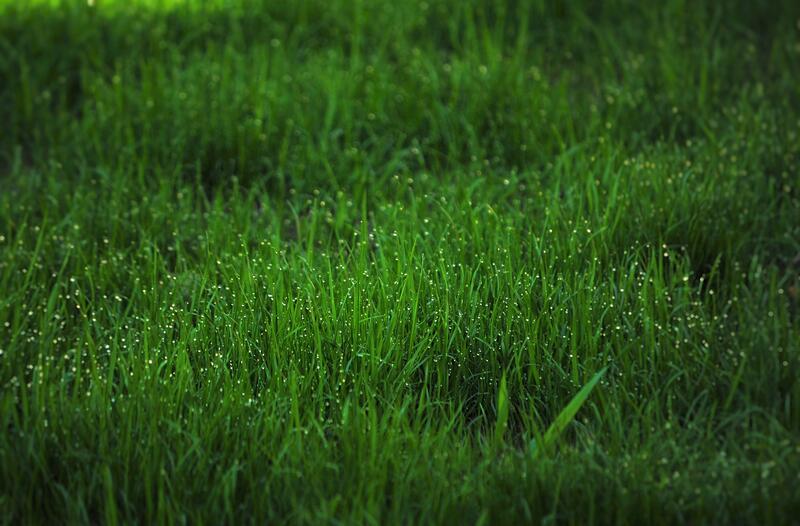
Like mowing with a dull blade, mowing wet grass might tear rather than cut the blades, resulting in an uneven cut that damages the health of your lawn. To get a neat, clean cut, mow your yard when it is dry.
“The factor I would consider is how much moisture is present in the turf when deciding to mow. Grass that is on the dry side is easier to mow and won’t clump as much as it is clipped, possibly blocking sunlight and inciting turfgrass disease,” says Goatley.
Solution: Check the weather radar ahead of time to see if your area is expecting rain. If your grass is soaked with morning dew or rainwater, wait to mow until the grass dries out in order to prevent grass clumping.
See Related: When Not to Mow Your Lawn
4. Mowing During the Heat of the Day
Mowing your lawn in the heat of the day stresses your lawn and causes discolored grass, ruining your lawn’s appearance. Additionally, mowing at the hottest part of the day can be dangerous for you, especially in extreme temperatures.
Solution: To protect your grass (and yourself), the best time to mow your lawn is in the cool parts of the day. The coolest parts of the day will be in the morning once the dew has dried or in the evening after 4 p.m. when the hottest hours of day have passed.
5. Mowing Too Infrequently
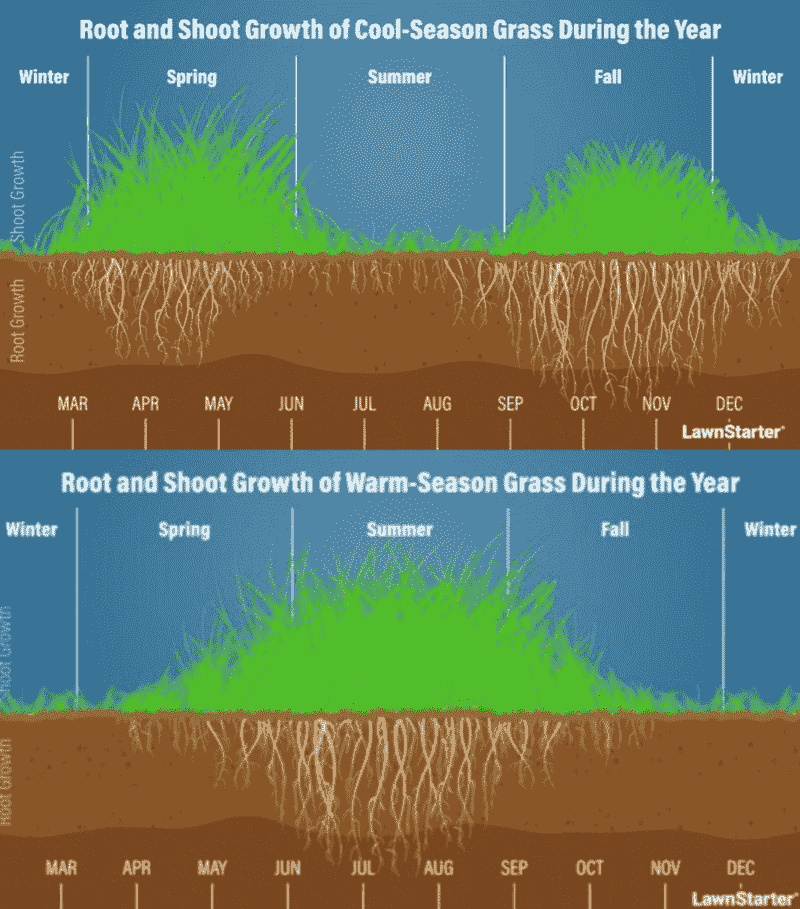
Don’t mow infrequently, especially during your grass’s peak season. It’s easy to procrastinate, but a common rookie mistake is to wait too long to cut the grass. Once grass has grown tall and dense, it’s more difficult to mow.
Solution: To create an appropriate mowing schedule, follow the one-third mowing rule to mow at the right frequency in every season.
Remember that for cool-season grasses, mowing frequency will be highest in spring and fall. For warm-season grasses, it’s highest in the summer. Change your mowing schedule as the rate of grass growth slows down or speeds up.
6. Always Mowing in the Same Pattern

If you’re a creature of habit, it’s tempting to follow the same pattern every time you mow. When you mow your lawn in the same pattern every time, it encourages grass to grow in the same direction. The result is that your grass will grow in an uneven pattern that leaves your yard full of ruts.
Solution: Add a little spontaneity to your lawn mowing routine by changing your mowing pattern. When you alter your mowing patterns, it allows grass to grow tall and even. The next time you bring out the lawn mower, make rows that are perpendicular or diagonal to the previous mowing pattern.
7. Not Overlapping Lines
It won’t hurt the health of your lawn if you don’t have overlapping lines, but it will ruin the aesthetics when there are untrimmed lines of grass poking up between neatly mowed rows.
Solution: Make sure your mowing lines overlap slightly to ensure an even cut on your lawn. Each time you start a new row, make it overlap slightly with the previous row.
My Experience: Like many homeowners, one weekend, I was in a rush to mow my lawn. To save time, I tried spacing my rows far apart but didn’t quite overlap my lines. The end result was that I created lines of tall grass peeking up in between the mowed rows, which made the yard look funny.
To fix my mowing mistake, I had to go back and mow over missed gaps. I learned my lesson that day: “Haste makes waste,” and making mowing mistakes ultimately costs more time. The best way to ensure that you don’t spend extra time correcting your mistakes is to do it right the first time.
8. Always Collecting Grass Clippings
If you always bag leftover grass clippings, you’re wasting free lawn fertilizer. Leaving grass clippings on your lawn is referred to as grasscycling. Grasscycling returns nutrients, such as nitrogen, back to the soil, becoming fertilizer that helps your grass grow.
Plus, using grass clippings as mulch means you won’t have to push around all that extra weight or stop to empty your lawn mower’s bag, which saves you time and effort.
Solution: Next time you mow, forget bagging. Just leave the grass clippings spread out on your lawn in an even layer.
Exception: While a light sprinkling of grass clippings acts as fertilizer for your grass, an excessive amount of clippings (from overgrown grass) is a detriment to your lawn. Diseased clippings also harm your lawn’s health if returned to the lawn, so bag the clippings in these cases.
9. Ignoring Lawn Mower Maintenance
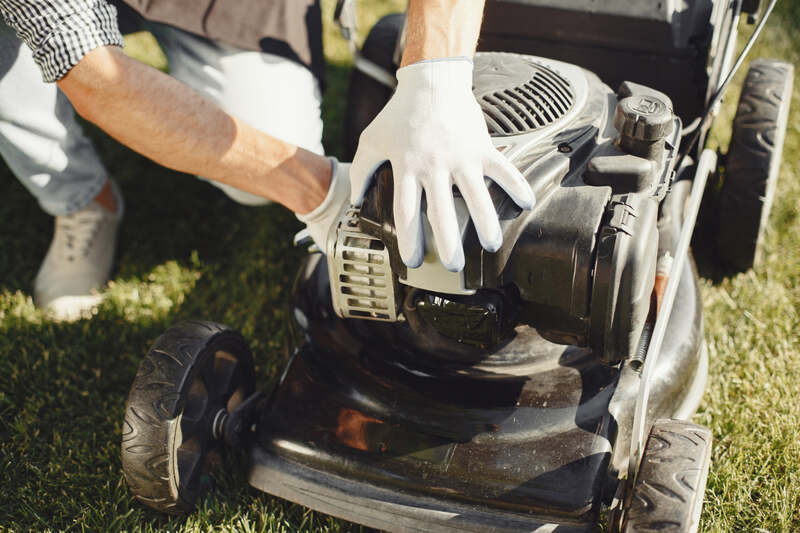
Nothing gets the job done better than a well-oiled machine. Like any other piece of equipment, a lawn mower requires diligent maintenance to run efficiently.
“Follow the warranty service recommendations for both gas- and electric-powered mowers, and don’t skimp on the maintenance criteria (changing oil and filters, servicing batteries, etc.) if you expect to get several seasons out of your mower,” says Goatley.
Solution: For seasonal DIY lawn mower maintenance, here are the things you should regularly do to keep your lawn mower in good condition:
- Sharpen lawn mower blades
- Clean the lawn mower
- Change the oil
- Change the spark plugs
- Clean air filters
- Check the batteries (electric mowers)
- Check or replace belts
- Inspect the tires
10. Not Cleaning Your Lawn Mower Deck
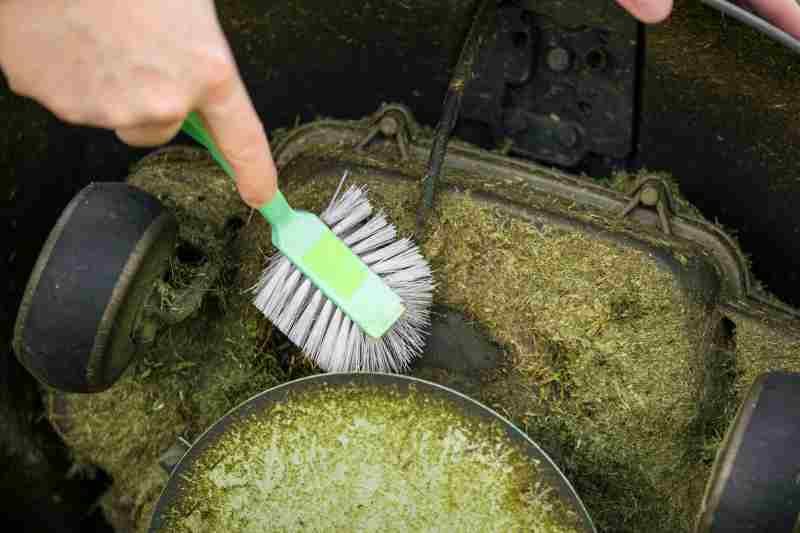
After trimming the grass in the summer heat, the last thing you want is another chore to take care of. Nonetheless, it’s important to clean your lawn mower deck after you trim the turfgrass since grass clippings are harder to clean off once the grass dries.
If you don’t clean your lawn mower, grass clippings corrode the mower deck or cause the mower to overheat.
Solution: Clean the underside of your lawn mower with a brush or by rinsing it out with water. This will protect your lawn mower from wear and tear caused by grass clippings stuck on the machinery.
11. Using the Wrong Lawn Mower
It might seem like you can buy any lawn mower for your yard and set to work. But for proper mowing, you need a lawn mower that is a good fit for your yard.
“Right off the bat one needs to decide if they want a gasoline-powered or an electric-powered mower (and the subsequent pros and cons with each), the width of cut, self-propelled or not, and something that I strongly encourage people to consider with a standard rotary mower deck — buy a mulching mower that does not have a discharge chute,” says Goatley.
Here are the criteria that Goatley advises to consider when you are in the market for a new lawn mower:
- Size of your lawn: It will be difficult to mow anything larger than half an acre with a push mower. Homeowners who own one-half acre or more should consider a riding lawn mower. It may be costly up-front, but it will save you time (and effort) in the long run.
- Mower type: There are a lot of different lawn mower types to consider, such as whether reel or rotary is better or if you prefer a mower powered by gas or electricity.
- Your budget: Lawn mowers are expensive equipment, so as you shop for a new lawn mower, research lawn mower costs, and look for models that are within your budget.
- Anticipated frequency of mowing: The more frequently you mow, the more wear and tear it causes your lawn mower over time. If you mow frequently, make sure you buy a hardy, long-lasting model.
Solution: Purchase a lawnmower that is right for your yard, based on the size of the yard and other criteria that your lawn needs.
See Related:
- Self-Propelled vs. Push Mowers
- 9 Best Lawn Mowers for Big Yards
- 10 Best Lawn Mowers for Small Yards
- 8 Best Lawn Mowers Under $300
12. Not Clearing Your Lawn
Running over objects in the yard with your lawn mower will damage your lawn mower or clog your machine. Flying objects are also a safety hazard to you or others in the yard.
Solution: Before you crank up your lawn mower, do a sweep of the yard and remove objects that might create an obstruction for your lawn mower. Don’t attempt to mow over natural debris such as large sticks, rocks, or pine cones. Your lawn mower isn’t designed to cut up thick materials.
Here are some of the things you might need to remove from your lawn before you mow:
- Branches or sticks
- Dog poop
- Litter
- Metal objects
- Pine cones
- Rocks
For things you can’t move, such as tree stumps or heavy rocks, be aware of where they are in your yard so you can avoid mowing over them. Instead, trim the grass around them with an edger. Once your yard is clear, you can mow without interference.
13. Mowing at High Speed
“Slow and steady wins the race” is a good adage to keep in mind whenever you mow the lawn. Hasty mowing results in ragged, uneven grass and a messy-looking yard. It’s also easy to miss spots when you are speeding through your lawn.
Solution: To get a perfect trim, it pays to focus more on doing a good job than a quick one. Mow your turfgrass at a steady, consistent pace to ensure that your grass is cut evenly.
FAQ About Common Mowing Mistakes
For unruly lawns that are overgrown by several inches, you should still follow the one-third mowing rule. Mow them more frequently, about every 2-3 days, until your grass is back to the desired height. Then, you can return to your normal mowing schedule.
Prices vary depending on the model, but on average, a mulching mower costs around $326.
See Related:
• 10 Best Mulching Lawn Mowers
• How Does a Mulching Mower Work?
Yes. Self-propelled mowers help you maintain a consistent speed of about 3 to 4 mph that cuts the grass evenly. Push mowers require more effort to push, which typically results in inconsistent mowing speeds and an uneven cut, especially in yards with steep inclines.
Mow Your Lawn the Right Way
Mowing at the right speed, at the right time, and staying on top of mowing maintenance are all things you can do to avoid common mowing mistakes. Proper mowing methods will help you keep your lawn green and healthy.
Does mowing your lawn yourself sound like too much of a chore? No problem. We can help you find a local lawn care company to take care of your mowing for you.
Read More: How to Mow Your Lawn the Right Way
Sources:
- Michael Goatley, professor and extension turfgrass specialist at Virginia Tech, Blacksburg, VA. Personal interview.
- “Mow Like a Pro.” By Mike Goatley, professor and extension turfgrass specialist. Virginia Cooperative Extension.
- “Mowing To Recycle Grass Clippings: Let the Clips Fall Where They May!” By David R. Chalmers, emeritus associate professor and extension agronomist, Judy Booze-Daniels, former research associate, and Michael Goatley, turfgrass specialist. Virginia Cooperative Extension.
Main Photo Credit: Belish / Adobe Stock Free / License